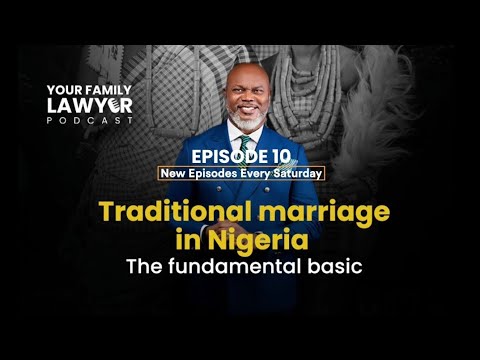Islamic Marriages in Nigeria – Part 1: Definition, Requirements, and the Role of Mahr
Host: My name is Chuma Chinye, and I am Your Family Lawyer.
“Welcome to Your Family Lawyer, the podcast that simplifies legal issues in the family and helps you understand your rights. Today, we’re looking into Islamic marriages in Nigeria. Ever wondered what makes an Islamic marriage lawful? We’ll break down what an Islamic marriage is, the roles of the Wali and Mahr, and why these elements are crucial.
Plus, we’ve got a real-life case that’ll give you a front-row seat to a courtroom drama involving Mahr. By the end of this episode, you’ll have a solid grasp of how an Islamic marriage is recognised in Nigeria and the legal impact of Mahr. Let’s jump in!”
Segment 1: Definition and Requirements of Islamic Marriages
“An Islamic marriage, or Nikah, is basically a contract of marriage between a man and a woman under Islamic law. In Nigeria, particularly in the northern states, Islamic law governs family matters like marriage, divorce, and inheritance. Unlike marriage under the Marriage Act, an Islamic marriage can be polygamous simply meaning that, a man can marry up to four wives, but only if he can treat them equally. Examples of this abound but eminent practitioners including former Vice President Atiku Abubakar and Senator Ned Nwoko who both married wives under Islamic Law and also married Igbo women under Igbo Native Law and Custom.
So, what do you need for a valid Islamic marriage?
- Consent of both parties.
- Witnesses.
- A Wali (guardian) for the bride.
- Mahr (a mandatory gift from the groom to the bride).
- A valid offer and acceptance (Ijab and Qabul).
These aren’t just random rules, they come straight from the Quran and Hadith, and they’re fundamental principles for a lawful marriage under Sharia.” “Just like in other marriages, both parties need to say, ‘Yes, I do,’ but there’s more. You need at least two witnesses to seal the deal. The Wali, usually a male guardian for the bride (like her dad or brother), must also give his thumbs up. His job? Making sure the bride isn’t being pressured into the marriage.
Then there’s the Mahr. It’s a mandatory gift from the groom to the bride. The amount can vary, but the Mahr is crucial it’s about securing the bride’s future. Without Mahr, there is no valid marriage in Islam.”
Segment 2: Role of the Wali and Mahr in Islamic Marriages
“Let’s get deeper into the Wali and Mahr because they are fundamental to the validity of an Islamic marriage.
The Wali is the bride’s guardian. His consent is a must for the marriage to be valid. He’s there to protect the bride’s interests, making sure she’s not getting a raw deal. No Wali’s approval? The marriage might be off the table, except in some special cases where the bride doesn’t need a Wali.
Then there’s the Mahr the must-have gift from the groom to the bride. The Mahr is the bride’s right, and it can be cash, property, or anything valuable. Think of it as financial security “assurance” for the bride, and it’s a sign of the groom’s commitment.
Both parties must agree on the Mahr before tying the knot. If they agree to defer the Mahr, it means part of it can be paid later, even if they split up. But here’s the kicker the Mahr isn’t just a formality. It’s a serious legal obligation under Islamic law.”
Segment 3: Case Study – Dispute Regarding Mahr in an Islamic Marriage
“Let’s spice things up with the case of FATIMA MUSA VS AHMED MUSA . In the heart of a solemn Sharia courtroom, where faith and justice intertwine, two lives converge at a pivotal moment. Bound by the promises of marriage but divided by unfulfilled obligations, Mr. Ahmed and Mrs. Fatima stand before the law, seeking resolution.
At the center of their dispute lies the mahr — a sacred gift, a cornerstone of Islamic marriage. Its absence now threatens the very foundation of their union. Today, this court must weigh tradition, intent, and fairness to deliver a verdict that will shape their futures.
This is not merely a legal battle but a testament to the sanctity of commitments in the eyes of God and man.
Here’s how it all played out.”
Screenplay
INT. SHARIA COURTROOM – DAY
The room is solemn, with a JUDGE presiding. Two parties, a MAN and WOMAN, stand at the front, separated by their respective LAWYERS. Spectators watch with keen interest.
JUDGE (to the audience) This court is now in session to deliberate the case of the validity of the marriage between Mr. Ahmed and Mrs. Fatima.
WOMAN’S LAWYER (rising) Your Honour, the foundation of this marriage rests upon the mahr, which was agreed upon but never paid at the time of the marriage ceremony. We argue that this renders the marriage invalid under Islamic Law.
MAN’S LAWYER (rising) Your Honour, the intent to pay the mahr was clear, and my client, Mr. Ahmed, intends to fulfill this obligation.
WOMAN (teary-eyed) But the promise was broken. Without the mahr, our marriage cannot stand.
JUDGE (raising a hand for silence) According to Islamic jurisprudence, the payment of mahr is essential at the time of marriage. Failure to fulfill this obligation compromises the validity of the union.
The JUDGE looks through the documents before him and nods solemnly.
JUDGE (cont’d) This court rules that the marriage between Mr. Ahmed and Mrs. Fatima is hereby declared invalid due to the non-payment of the mahr at the time of the ceremony. The decision is final and binding.
The WOMAN sighs in relief, while the MAN lowers his head in acceptance.
FADE OUT.
Narrator “And so, the case of Ahmed and Fatima comes to an end. A story of love lost and the pursuit of independence through the lens of Islamic law.”
Segment 4: Legal Implications – The Significance of Mahr in Nigeria
“Now, let’s talk about the legal implications of Mahr and its recognition in Nigeria. In states where Sharia law is implemented, Islamic marriages are governed by religious laws, and the Mahr is recognised as a legally enforceable obligation.
Even in other parts of Nigeria, the concept of Mahr is respected, especially in Islamic communities. The courts recognise that Mahr forms an essential part of the marriage contract, and failure to fulfill this obligation can lead to significant legal consequences.
In cases of divorce, Mahr plays an even more important role. If the Mahr was deferred, the groom is required to pay it in full before the divorce is finalised. This ensures that the bride is financially compensated even after the marriage ends. The Mahr also affects the division of assets, as it is treated separately from any jointly owned property.”
“Mahr serves as a form of protection for the bride, ensuring that she has financial security in the event of divorce or the death of her husband. In this way, Mahr is seen as both a gift and a legal right, safeguarding the bride’s interests long after the wedding ceremony.”
“In summary, an Islamic marriage is more than just a religious or cultural practice it’s a legal contract with clearly defined rights and obligations. The role of the Wali and the Mahr are central to this contract, ensuring that the bride’s interests are protected.
If you are entering into an Islamic marriage, it’s essential to understand your rights and obligations under both Islamic law and Nigerian law. Make sure that the terms of the Mahr are clear and agreed upon by both parties to avoid future disputes.
This where we draw the curtain on today’s episode of Your Family Lawyer. Be sure to join us next week for Part 2, where we’ll explore the rights of women in Islamic marriages, including divorce and inheritance. Until then, stay informed, stay empowered. And be good to your family!” My name is Chuma Chinye, and I am Your Family Lawyer.







